Case Study: Recycling Practices at Rosewood Hotel London
VerifiedAdded on 2020/12/10
|44
|9835
|239
Case Study
AI Summary
This case study investigates the implementation and impact of recycling practices within the hospitality industry, focusing on Rosewood Hotel London. The study employs a cross-sectional design, utilizing qualitative data gathered through primary research methods and analyzed thematically. It highlights the potential financial benefits and contributions to sustainability that the hospitality sector can achieve through effective recycling programs. The research identifies the importance of recycling, critical factors influencing its adoption, and its impact on sustainable development. The study also acknowledges limitations, such as the need for a more comprehensive analysis of various recycling methods and their associated challenges. Recommendations emphasize the integration of recycling practices into waste management programs for sustainable development within the hospitality sector. The significance of the study lies in promoting sustainable practices and aiding hospitality organizations in managing their waste effectively. The study emphasizes the role of recycling in reducing waste, enhancing operational efficiency, and contributing to environmental conservation, with specific examples like the potential for cost savings through recycling food waste. The study also discusses the limitations of recycling practices, such as space constraints and the complexity of waste collection, and suggests that these limitations can be addressed through effective waste management schemes and staff training.
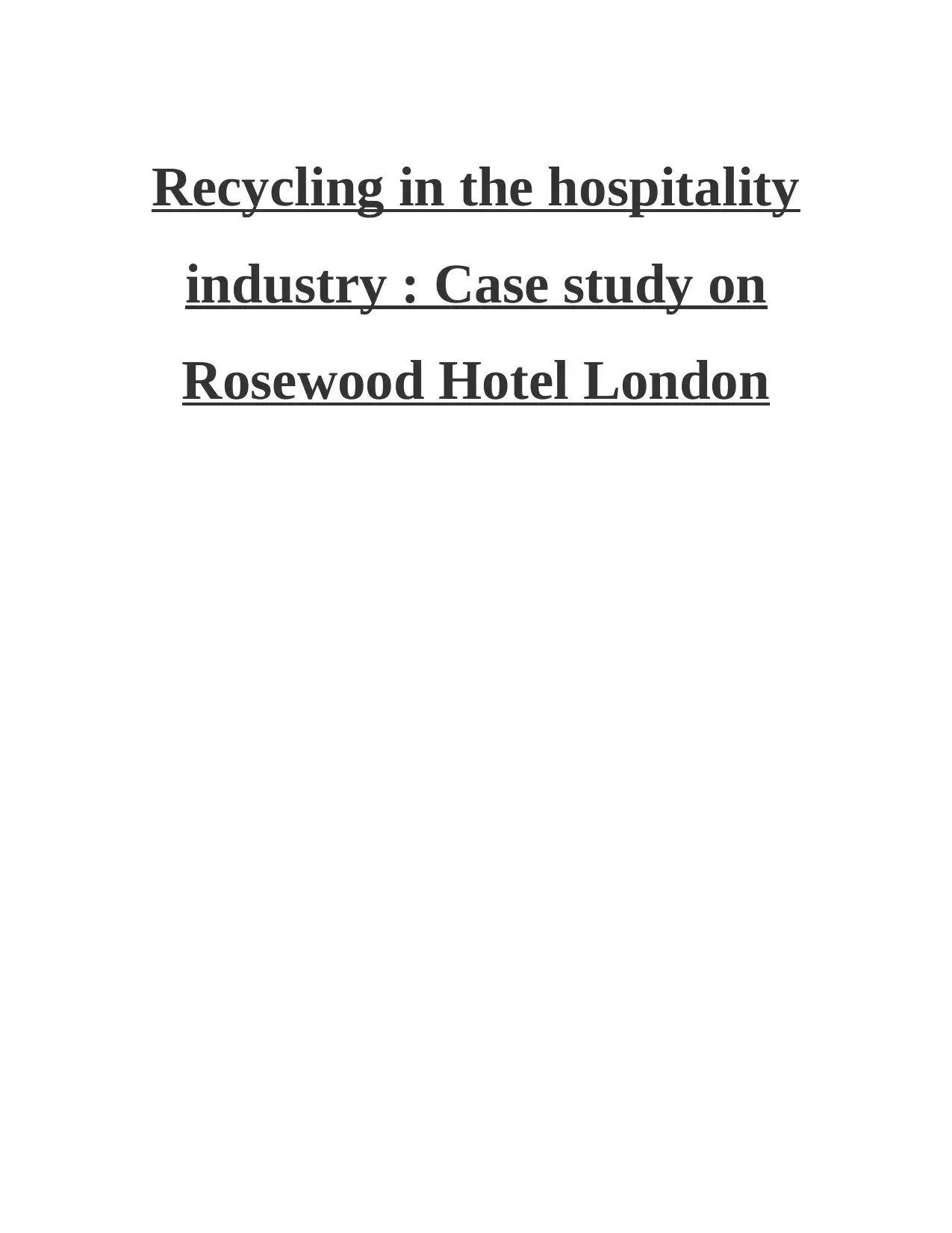
Recycling in the hospitality
industry : Case study on
Rosewood Hotel London
industry : Case study on
Rosewood Hotel London
Paraphrase This Document
Need a fresh take? Get an instant paraphrase of this document with our AI Paraphraser
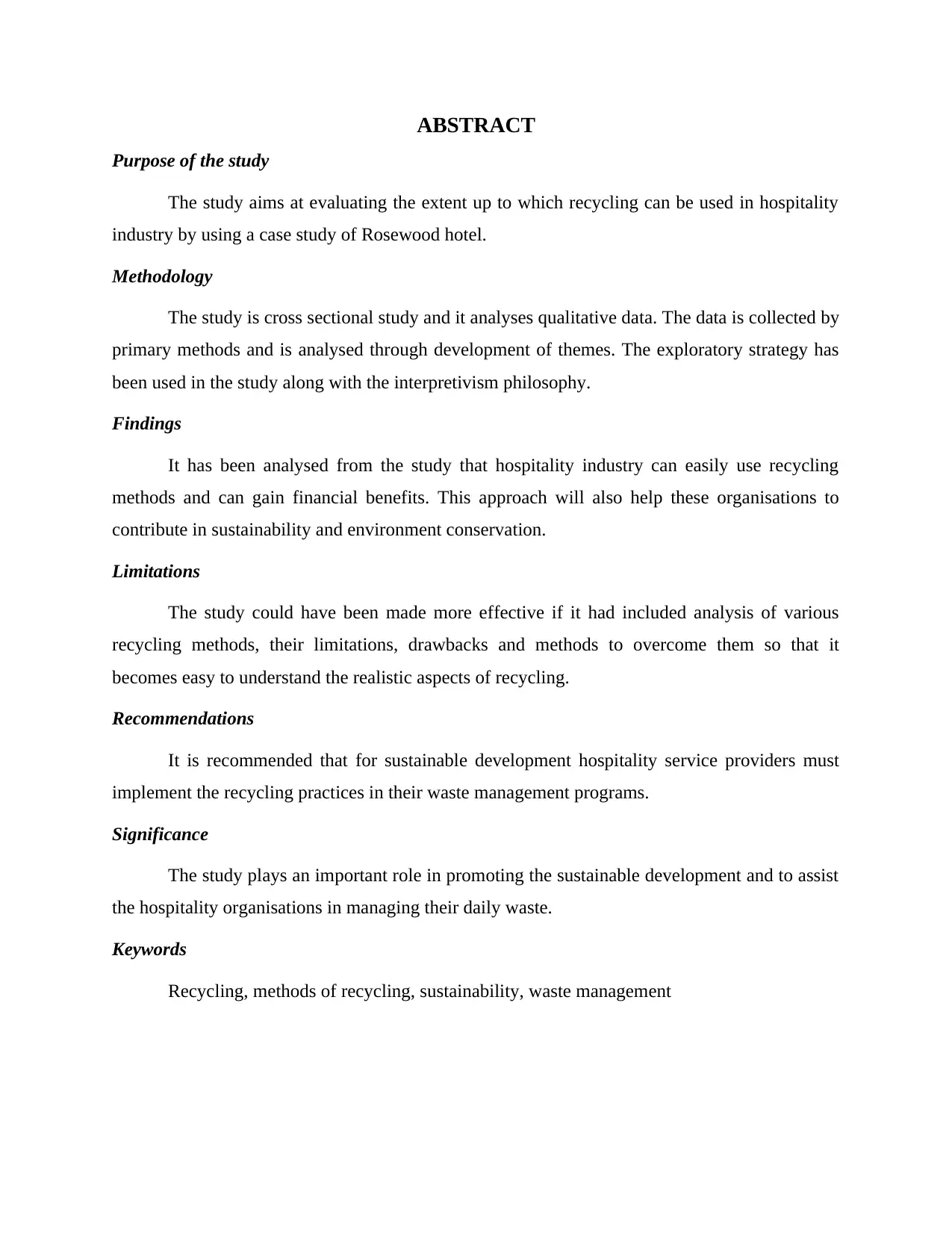
ABSTRACT
Purpose of the study
The study aims at evaluating the extent up to which recycling can be used in hospitality
industry by using a case study of Rosewood hotel.
Methodology
The study is cross sectional study and it analyses qualitative data. The data is collected by
primary methods and is analysed through development of themes. The exploratory strategy has
been used in the study along with the interpretivism philosophy.
Findings
It has been analysed from the study that hospitality industry can easily use recycling
methods and can gain financial benefits. This approach will also help these organisations to
contribute in sustainability and environment conservation.
Limitations
The study could have been made more effective if it had included analysis of various
recycling methods, their limitations, drawbacks and methods to overcome them so that it
becomes easy to understand the realistic aspects of recycling.
Recommendations
It is recommended that for sustainable development hospitality service providers must
implement the recycling practices in their waste management programs.
Significance
The study plays an important role in promoting the sustainable development and to assist
the hospitality organisations in managing their daily waste.
Keywords
Recycling, methods of recycling, sustainability, waste management
Purpose of the study
The study aims at evaluating the extent up to which recycling can be used in hospitality
industry by using a case study of Rosewood hotel.
Methodology
The study is cross sectional study and it analyses qualitative data. The data is collected by
primary methods and is analysed through development of themes. The exploratory strategy has
been used in the study along with the interpretivism philosophy.
Findings
It has been analysed from the study that hospitality industry can easily use recycling
methods and can gain financial benefits. This approach will also help these organisations to
contribute in sustainability and environment conservation.
Limitations
The study could have been made more effective if it had included analysis of various
recycling methods, their limitations, drawbacks and methods to overcome them so that it
becomes easy to understand the realistic aspects of recycling.
Recommendations
It is recommended that for sustainable development hospitality service providers must
implement the recycling practices in their waste management programs.
Significance
The study plays an important role in promoting the sustainable development and to assist
the hospitality organisations in managing their daily waste.
Keywords
Recycling, methods of recycling, sustainability, waste management
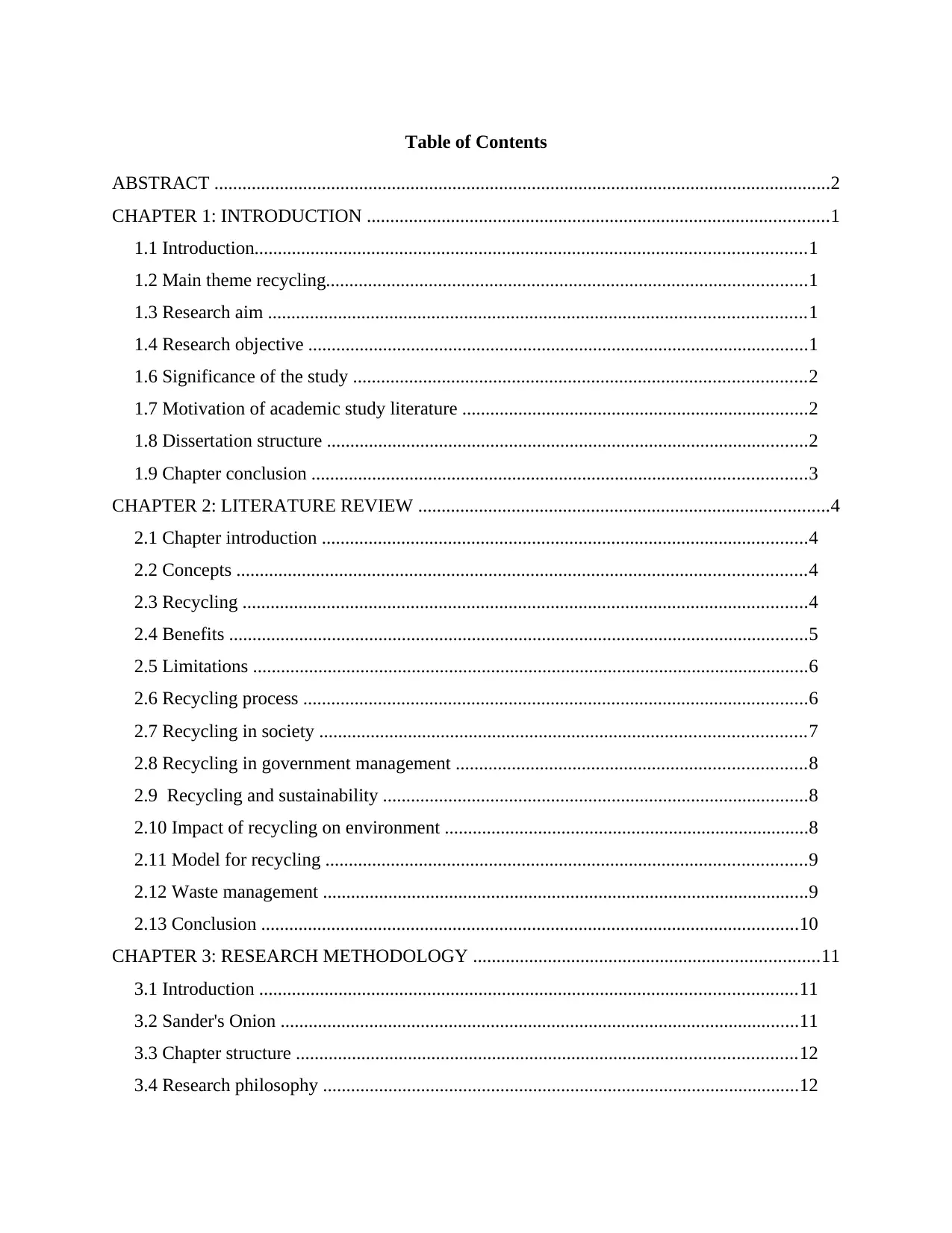
Table of Contents
ABSTRACT ....................................................................................................................................2
CHAPTER 1: INTRODUCTION ...................................................................................................1
1.1 Introduction......................................................................................................................1
1.2 Main theme recycling.......................................................................................................1
1.3 Research aim ...................................................................................................................1
1.4 Research objective ...........................................................................................................1
1.6 Significance of the study .................................................................................................2
1.7 Motivation of academic study literature ..........................................................................2
1.8 Dissertation structure .......................................................................................................2
1.9 Chapter conclusion ..........................................................................................................3
CHAPTER 2: LITERATURE REVIEW ........................................................................................4
2.1 Chapter introduction ........................................................................................................4
2.2 Concepts ..........................................................................................................................4
2.3 Recycling .........................................................................................................................4
2.4 Benefits ............................................................................................................................5
2.5 Limitations .......................................................................................................................6
2.6 Recycling process ............................................................................................................6
2.7 Recycling in society ........................................................................................................7
2.8 Recycling in government management ...........................................................................8
2.9 Recycling and sustainability ...........................................................................................8
2.10 Impact of recycling on environment ..............................................................................8
2.11 Model for recycling .......................................................................................................9
2.12 Waste management ........................................................................................................9
2.13 Conclusion ...................................................................................................................10
CHAPTER 3: RESEARCH METHODOLOGY ..........................................................................11
3.1 Introduction ...................................................................................................................11
3.2 Sander's Onion ...............................................................................................................11
3.3 Chapter structure ...........................................................................................................12
3.4 Research philosophy ......................................................................................................12
ABSTRACT ....................................................................................................................................2
CHAPTER 1: INTRODUCTION ...................................................................................................1
1.1 Introduction......................................................................................................................1
1.2 Main theme recycling.......................................................................................................1
1.3 Research aim ...................................................................................................................1
1.4 Research objective ...........................................................................................................1
1.6 Significance of the study .................................................................................................2
1.7 Motivation of academic study literature ..........................................................................2
1.8 Dissertation structure .......................................................................................................2
1.9 Chapter conclusion ..........................................................................................................3
CHAPTER 2: LITERATURE REVIEW ........................................................................................4
2.1 Chapter introduction ........................................................................................................4
2.2 Concepts ..........................................................................................................................4
2.3 Recycling .........................................................................................................................4
2.4 Benefits ............................................................................................................................5
2.5 Limitations .......................................................................................................................6
2.6 Recycling process ............................................................................................................6
2.7 Recycling in society ........................................................................................................7
2.8 Recycling in government management ...........................................................................8
2.9 Recycling and sustainability ...........................................................................................8
2.10 Impact of recycling on environment ..............................................................................8
2.11 Model for recycling .......................................................................................................9
2.12 Waste management ........................................................................................................9
2.13 Conclusion ...................................................................................................................10
CHAPTER 3: RESEARCH METHODOLOGY ..........................................................................11
3.1 Introduction ...................................................................................................................11
3.2 Sander's Onion ...............................................................................................................11
3.3 Chapter structure ...........................................................................................................12
3.4 Research philosophy ......................................................................................................12
⊘ This is a preview!⊘
Do you want full access?
Subscribe today to unlock all pages.

Trusted by 1+ million students worldwide
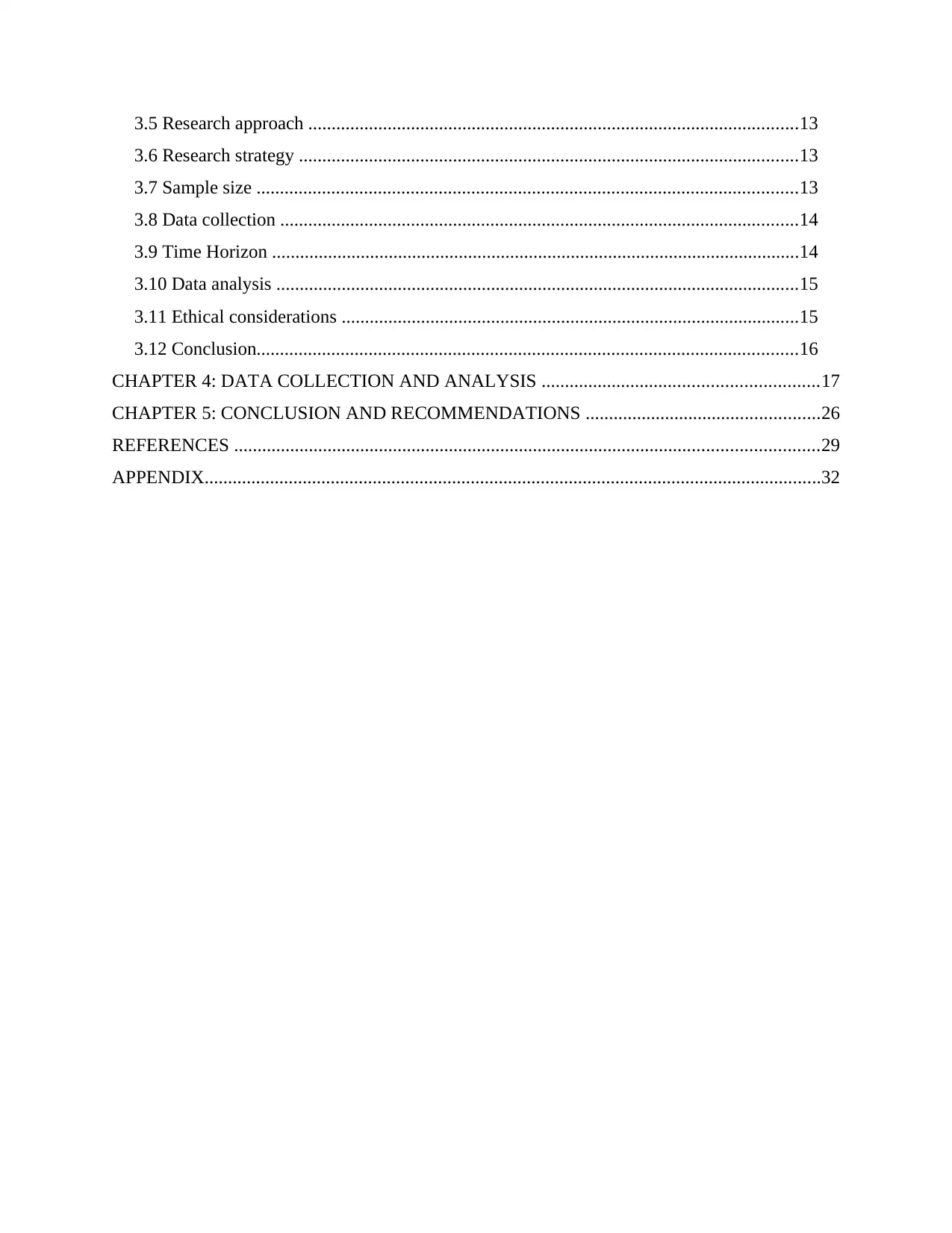
3.5 Research approach .........................................................................................................13
3.6 Research strategy ...........................................................................................................13
3.7 Sample size ....................................................................................................................13
3.8 Data collection ...............................................................................................................14
3.9 Time Horizon .................................................................................................................14
3.10 Data analysis ................................................................................................................15
3.11 Ethical considerations ..................................................................................................15
3.12 Conclusion....................................................................................................................16
CHAPTER 4: DATA COLLECTION AND ANALYSIS ...........................................................17
CHAPTER 5: CONCLUSION AND RECOMMENDATIONS ..................................................26
REFERENCES .............................................................................................................................29
APPENDIX....................................................................................................................................32
3.6 Research strategy ...........................................................................................................13
3.7 Sample size ....................................................................................................................13
3.8 Data collection ...............................................................................................................14
3.9 Time Horizon .................................................................................................................14
3.10 Data analysis ................................................................................................................15
3.11 Ethical considerations ..................................................................................................15
3.12 Conclusion....................................................................................................................16
CHAPTER 4: DATA COLLECTION AND ANALYSIS ...........................................................17
CHAPTER 5: CONCLUSION AND RECOMMENDATIONS ..................................................26
REFERENCES .............................................................................................................................29
APPENDIX....................................................................................................................................32
Paraphrase This Document
Need a fresh take? Get an instant paraphrase of this document with our AI Paraphraser
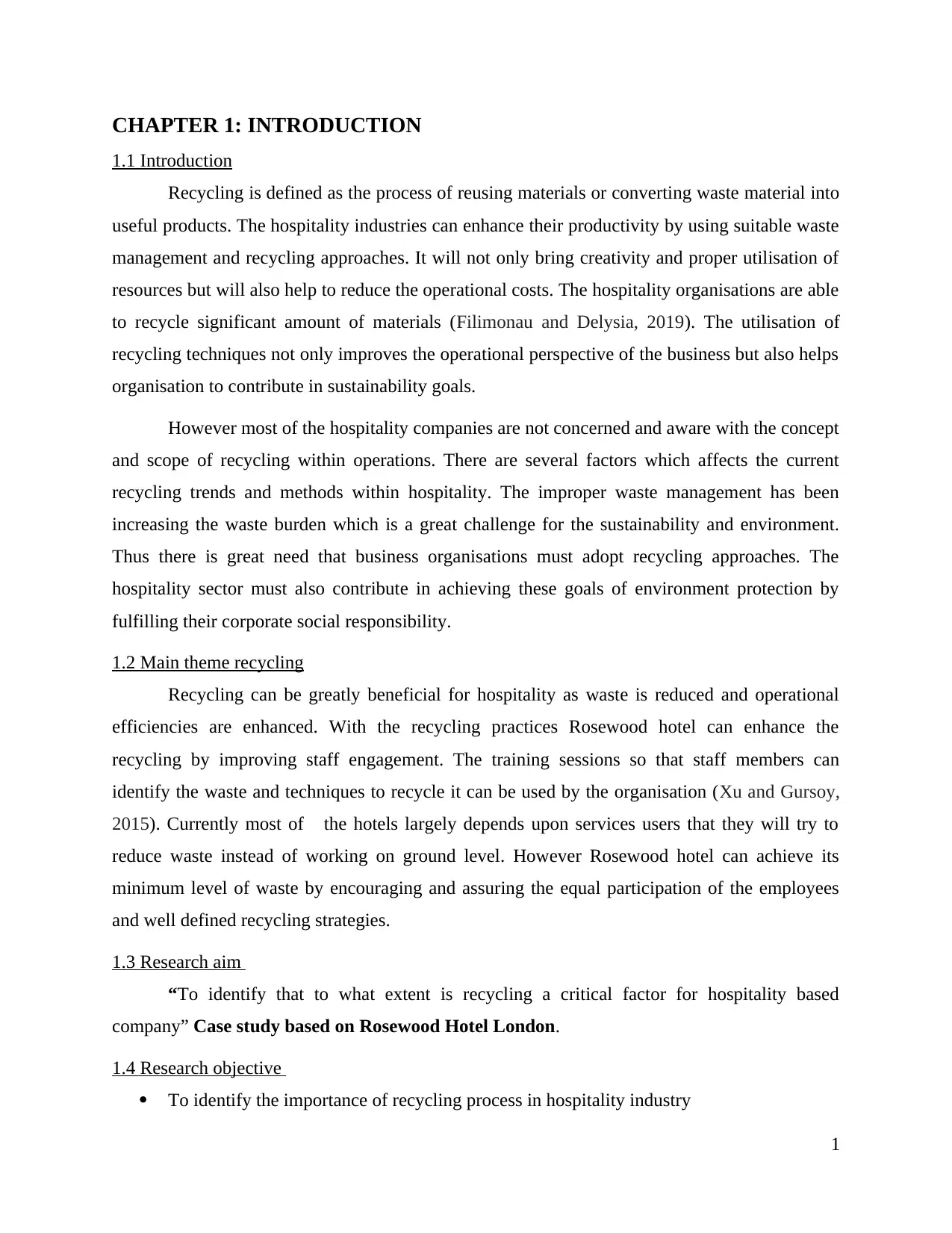
CHAPTER 1: INTRODUCTION
1.1 Introduction
Recycling is defined as the process of reusing materials or converting waste material into
useful products. The hospitality industries can enhance their productivity by using suitable waste
management and recycling approaches. It will not only bring creativity and proper utilisation of
resources but will also help to reduce the operational costs. The hospitality organisations are able
to recycle significant amount of materials (Filimonau and Delysia, 2019). The utilisation of
recycling techniques not only improves the operational perspective of the business but also helps
organisation to contribute in sustainability goals.
However most of the hospitality companies are not concerned and aware with the concept
and scope of recycling within operations. There are several factors which affects the current
recycling trends and methods within hospitality. The improper waste management has been
increasing the waste burden which is a great challenge for the sustainability and environment.
Thus there is great need that business organisations must adopt recycling approaches. The
hospitality sector must also contribute in achieving these goals of environment protection by
fulfilling their corporate social responsibility.
1.2 Main theme recycling
Recycling can be greatly beneficial for hospitality as waste is reduced and operational
efficiencies are enhanced. With the recycling practices Rosewood hotel can enhance the
recycling by improving staff engagement. The training sessions so that staff members can
identify the waste and techniques to recycle it can be used by the organisation (Xu and Gursoy,
2015). Currently most of the hotels largely depends upon services users that they will try to
reduce waste instead of working on ground level. However Rosewood hotel can achieve its
minimum level of waste by encouraging and assuring the equal participation of the employees
and well defined recycling strategies.
1.3 Research aim
“To identify that to what extent is recycling a critical factor for hospitality based
company” Case study based on Rosewood Hotel London.
1.4 Research objective
To identify the importance of recycling process in hospitality industry
1
1.1 Introduction
Recycling is defined as the process of reusing materials or converting waste material into
useful products. The hospitality industries can enhance their productivity by using suitable waste
management and recycling approaches. It will not only bring creativity and proper utilisation of
resources but will also help to reduce the operational costs. The hospitality organisations are able
to recycle significant amount of materials (Filimonau and Delysia, 2019). The utilisation of
recycling techniques not only improves the operational perspective of the business but also helps
organisation to contribute in sustainability goals.
However most of the hospitality companies are not concerned and aware with the concept
and scope of recycling within operations. There are several factors which affects the current
recycling trends and methods within hospitality. The improper waste management has been
increasing the waste burden which is a great challenge for the sustainability and environment.
Thus there is great need that business organisations must adopt recycling approaches. The
hospitality sector must also contribute in achieving these goals of environment protection by
fulfilling their corporate social responsibility.
1.2 Main theme recycling
Recycling can be greatly beneficial for hospitality as waste is reduced and operational
efficiencies are enhanced. With the recycling practices Rosewood hotel can enhance the
recycling by improving staff engagement. The training sessions so that staff members can
identify the waste and techniques to recycle it can be used by the organisation (Xu and Gursoy,
2015). Currently most of the hotels largely depends upon services users that they will try to
reduce waste instead of working on ground level. However Rosewood hotel can achieve its
minimum level of waste by encouraging and assuring the equal participation of the employees
and well defined recycling strategies.
1.3 Research aim
“To identify that to what extent is recycling a critical factor for hospitality based
company” Case study based on Rosewood Hotel London.
1.4 Research objective
To identify the importance of recycling process in hospitality industry
1
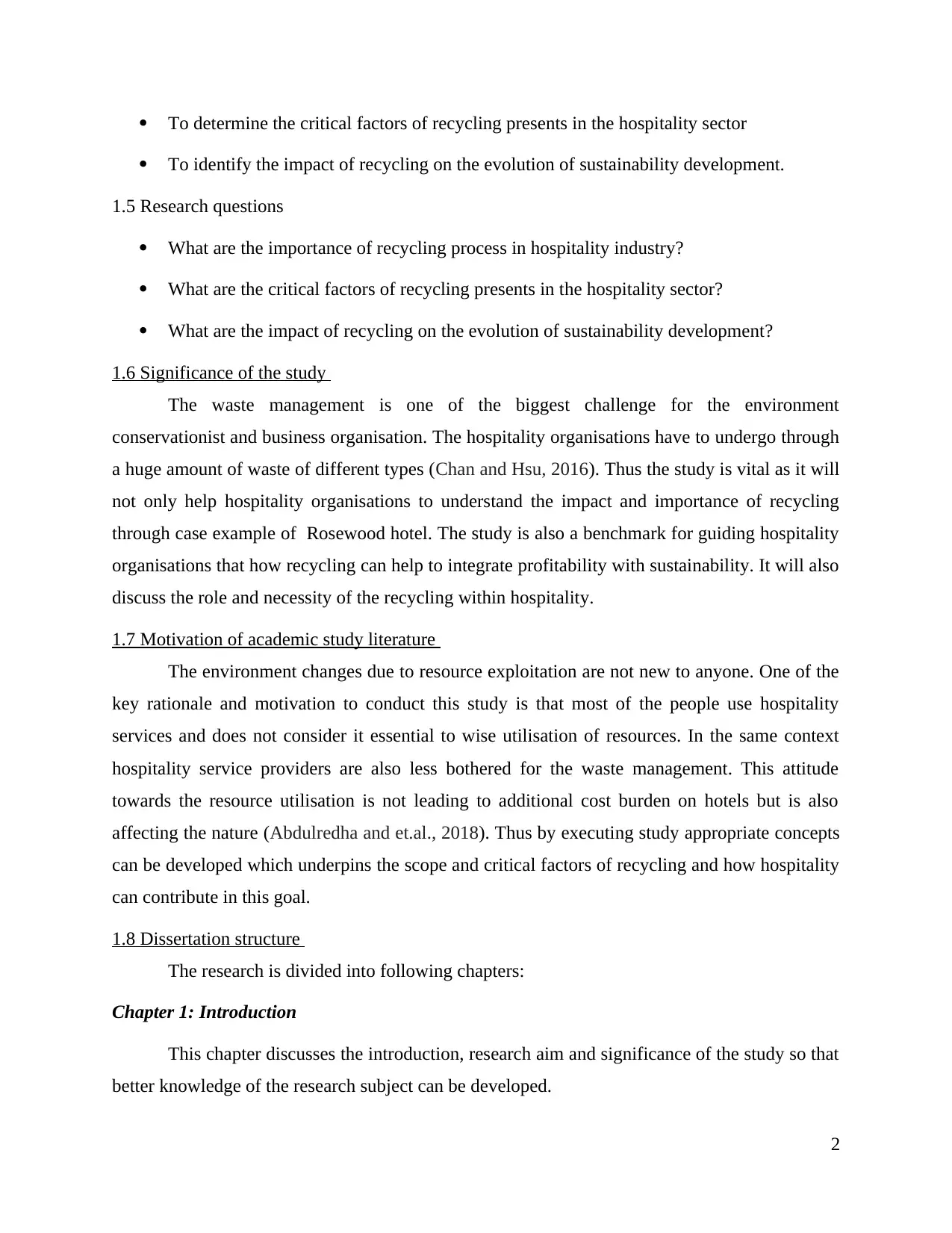
To determine the critical factors of recycling presents in the hospitality sector
To identify the impact of recycling on the evolution of sustainability development.
1.5 Research questions
What are the importance of recycling process in hospitality industry?
What are the critical factors of recycling presents in the hospitality sector?
What are the impact of recycling on the evolution of sustainability development?
1.6 Significance of the study
The waste management is one of the biggest challenge for the environment
conservationist and business organisation. The hospitality organisations have to undergo through
a huge amount of waste of different types (Chan and Hsu, 2016). Thus the study is vital as it will
not only help hospitality organisations to understand the impact and importance of recycling
through case example of Rosewood hotel. The study is also a benchmark for guiding hospitality
organisations that how recycling can help to integrate profitability with sustainability. It will also
discuss the role and necessity of the recycling within hospitality.
1.7 Motivation of academic study literature
The environment changes due to resource exploitation are not new to anyone. One of the
key rationale and motivation to conduct this study is that most of the people use hospitality
services and does not consider it essential to wise utilisation of resources. In the same context
hospitality service providers are also less bothered for the waste management. This attitude
towards the resource utilisation is not leading to additional cost burden on hotels but is also
affecting the nature (Abdulredha and et.al., 2018). Thus by executing study appropriate concepts
can be developed which underpins the scope and critical factors of recycling and how hospitality
can contribute in this goal.
1.8 Dissertation structure
The research is divided into following chapters:
Chapter 1: Introduction
This chapter discusses the introduction, research aim and significance of the study so that
better knowledge of the research subject can be developed.
2
To identify the impact of recycling on the evolution of sustainability development.
1.5 Research questions
What are the importance of recycling process in hospitality industry?
What are the critical factors of recycling presents in the hospitality sector?
What are the impact of recycling on the evolution of sustainability development?
1.6 Significance of the study
The waste management is one of the biggest challenge for the environment
conservationist and business organisation. The hospitality organisations have to undergo through
a huge amount of waste of different types (Chan and Hsu, 2016). Thus the study is vital as it will
not only help hospitality organisations to understand the impact and importance of recycling
through case example of Rosewood hotel. The study is also a benchmark for guiding hospitality
organisations that how recycling can help to integrate profitability with sustainability. It will also
discuss the role and necessity of the recycling within hospitality.
1.7 Motivation of academic study literature
The environment changes due to resource exploitation are not new to anyone. One of the
key rationale and motivation to conduct this study is that most of the people use hospitality
services and does not consider it essential to wise utilisation of resources. In the same context
hospitality service providers are also less bothered for the waste management. This attitude
towards the resource utilisation is not leading to additional cost burden on hotels but is also
affecting the nature (Abdulredha and et.al., 2018). Thus by executing study appropriate concepts
can be developed which underpins the scope and critical factors of recycling and how hospitality
can contribute in this goal.
1.8 Dissertation structure
The research is divided into following chapters:
Chapter 1: Introduction
This chapter discusses the introduction, research aim and significance of the study so that
better knowledge of the research subject can be developed.
2
⊘ This is a preview!⊘
Do you want full access?
Subscribe today to unlock all pages.

Trusted by 1+ million students worldwide
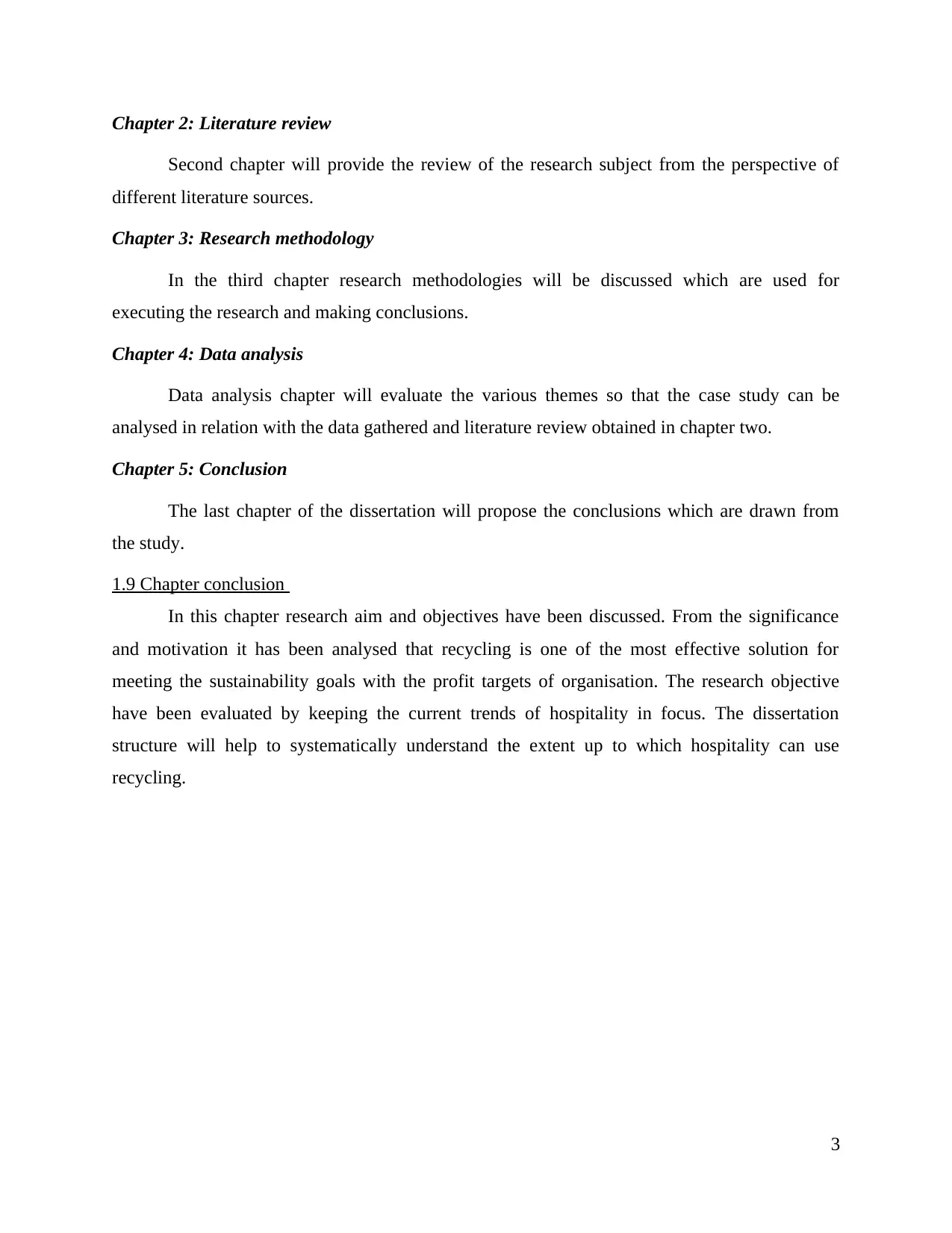
Chapter 2: Literature review
Second chapter will provide the review of the research subject from the perspective of
different literature sources.
Chapter 3: Research methodology
In the third chapter research methodologies will be discussed which are used for
executing the research and making conclusions.
Chapter 4: Data analysis
Data analysis chapter will evaluate the various themes so that the case study can be
analysed in relation with the data gathered and literature review obtained in chapter two.
Chapter 5: Conclusion
The last chapter of the dissertation will propose the conclusions which are drawn from
the study.
1.9 Chapter conclusion
In this chapter research aim and objectives have been discussed. From the significance
and motivation it has been analysed that recycling is one of the most effective solution for
meeting the sustainability goals with the profit targets of organisation. The research objective
have been evaluated by keeping the current trends of hospitality in focus. The dissertation
structure will help to systematically understand the extent up to which hospitality can use
recycling.
3
Second chapter will provide the review of the research subject from the perspective of
different literature sources.
Chapter 3: Research methodology
In the third chapter research methodologies will be discussed which are used for
executing the research and making conclusions.
Chapter 4: Data analysis
Data analysis chapter will evaluate the various themes so that the case study can be
analysed in relation with the data gathered and literature review obtained in chapter two.
Chapter 5: Conclusion
The last chapter of the dissertation will propose the conclusions which are drawn from
the study.
1.9 Chapter conclusion
In this chapter research aim and objectives have been discussed. From the significance
and motivation it has been analysed that recycling is one of the most effective solution for
meeting the sustainability goals with the profit targets of organisation. The research objective
have been evaluated by keeping the current trends of hospitality in focus. The dissertation
structure will help to systematically understand the extent up to which hospitality can use
recycling.
3
Paraphrase This Document
Need a fresh take? Get an instant paraphrase of this document with our AI Paraphraser
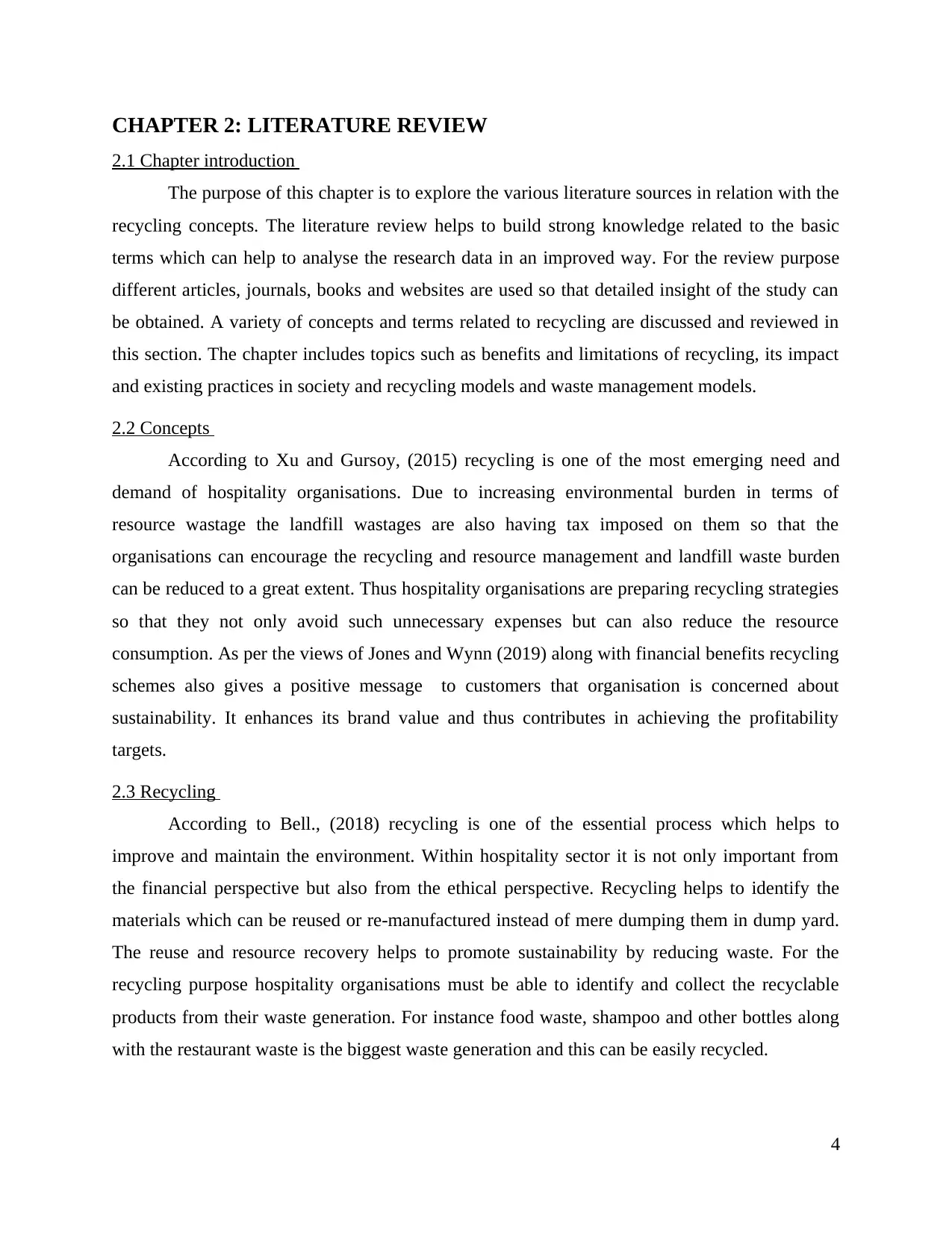
CHAPTER 2: LITERATURE REVIEW
2.1 Chapter introduction
The purpose of this chapter is to explore the various literature sources in relation with the
recycling concepts. The literature review helps to build strong knowledge related to the basic
terms which can help to analyse the research data in an improved way. For the review purpose
different articles, journals, books and websites are used so that detailed insight of the study can
be obtained. A variety of concepts and terms related to recycling are discussed and reviewed in
this section. The chapter includes topics such as benefits and limitations of recycling, its impact
and existing practices in society and recycling models and waste management models.
2.2 Concepts
According to Xu and Gursoy, (2015) recycling is one of the most emerging need and
demand of hospitality organisations. Due to increasing environmental burden in terms of
resource wastage the landfill wastages are also having tax imposed on them so that the
organisations can encourage the recycling and resource management and landfill waste burden
can be reduced to a great extent. Thus hospitality organisations are preparing recycling strategies
so that they not only avoid such unnecessary expenses but can also reduce the resource
consumption. As per the views of Jones and Wynn (2019) along with financial benefits recycling
schemes also gives a positive message to customers that organisation is concerned about
sustainability. It enhances its brand value and thus contributes in achieving the profitability
targets.
2.3 Recycling
According to Bell., (2018) recycling is one of the essential process which helps to
improve and maintain the environment. Within hospitality sector it is not only important from
the financial perspective but also from the ethical perspective. Recycling helps to identify the
materials which can be reused or re-manufactured instead of mere dumping them in dump yard.
The reuse and resource recovery helps to promote sustainability by reducing waste. For the
recycling purpose hospitality organisations must be able to identify and collect the recyclable
products from their waste generation. For instance food waste, shampoo and other bottles along
with the restaurant waste is the biggest waste generation and this can be easily recycled.
4
2.1 Chapter introduction
The purpose of this chapter is to explore the various literature sources in relation with the
recycling concepts. The literature review helps to build strong knowledge related to the basic
terms which can help to analyse the research data in an improved way. For the review purpose
different articles, journals, books and websites are used so that detailed insight of the study can
be obtained. A variety of concepts and terms related to recycling are discussed and reviewed in
this section. The chapter includes topics such as benefits and limitations of recycling, its impact
and existing practices in society and recycling models and waste management models.
2.2 Concepts
According to Xu and Gursoy, (2015) recycling is one of the most emerging need and
demand of hospitality organisations. Due to increasing environmental burden in terms of
resource wastage the landfill wastages are also having tax imposed on them so that the
organisations can encourage the recycling and resource management and landfill waste burden
can be reduced to a great extent. Thus hospitality organisations are preparing recycling strategies
so that they not only avoid such unnecessary expenses but can also reduce the resource
consumption. As per the views of Jones and Wynn (2019) along with financial benefits recycling
schemes also gives a positive message to customers that organisation is concerned about
sustainability. It enhances its brand value and thus contributes in achieving the profitability
targets.
2.3 Recycling
According to Bell., (2018) recycling is one of the essential process which helps to
improve and maintain the environment. Within hospitality sector it is not only important from
the financial perspective but also from the ethical perspective. Recycling helps to identify the
materials which can be reused or re-manufactured instead of mere dumping them in dump yard.
The reuse and resource recovery helps to promote sustainability by reducing waste. For the
recycling purpose hospitality organisations must be able to identify and collect the recyclable
products from their waste generation. For instance food waste, shampoo and other bottles along
with the restaurant waste is the biggest waste generation and this can be easily recycled.
4
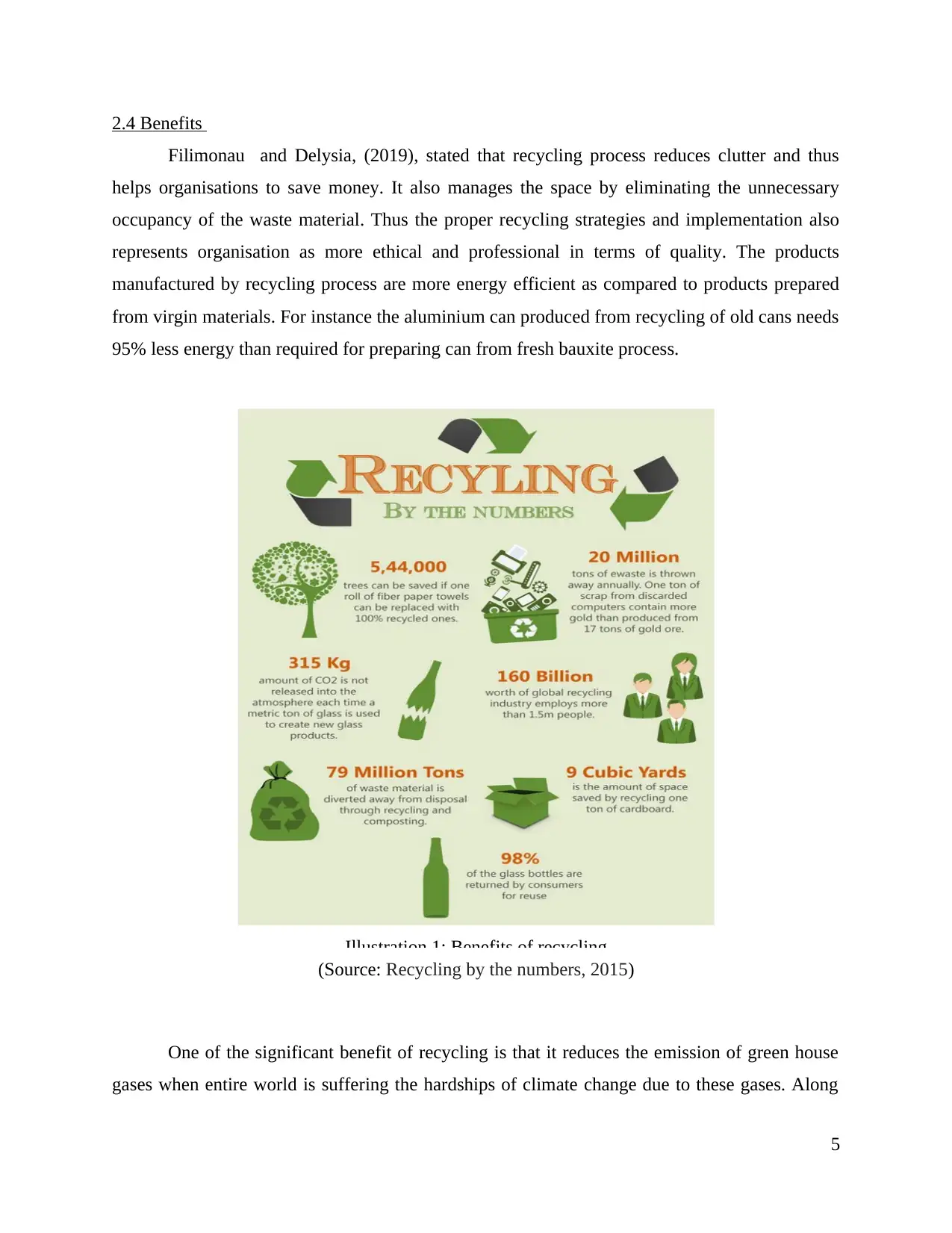
2.4 Benefits
Filimonau and Delysia, (2019), stated that recycling process reduces clutter and thus
helps organisations to save money. It also manages the space by eliminating the unnecessary
occupancy of the waste material. Thus the proper recycling strategies and implementation also
represents organisation as more ethical and professional in terms of quality. The products
manufactured by recycling process are more energy efficient as compared to products prepared
from virgin materials. For instance the aluminium can produced from recycling of old cans needs
95% less energy than required for preparing can from fresh bauxite process.
(Source: Recycling by the numbers, 2015)
One of the significant benefit of recycling is that it reduces the emission of green house
gases when entire world is suffering the hardships of climate change due to these gases. Along
5
Illustration 1: Benefits of recycling
Filimonau and Delysia, (2019), stated that recycling process reduces clutter and thus
helps organisations to save money. It also manages the space by eliminating the unnecessary
occupancy of the waste material. Thus the proper recycling strategies and implementation also
represents organisation as more ethical and professional in terms of quality. The products
manufactured by recycling process are more energy efficient as compared to products prepared
from virgin materials. For instance the aluminium can produced from recycling of old cans needs
95% less energy than required for preparing can from fresh bauxite process.
(Source: Recycling by the numbers, 2015)
One of the significant benefit of recycling is that it reduces the emission of green house
gases when entire world is suffering the hardships of climate change due to these gases. Along
5
Illustration 1: Benefits of recycling
⊘ This is a preview!⊘
Do you want full access?
Subscribe today to unlock all pages.

Trusted by 1+ million students worldwide
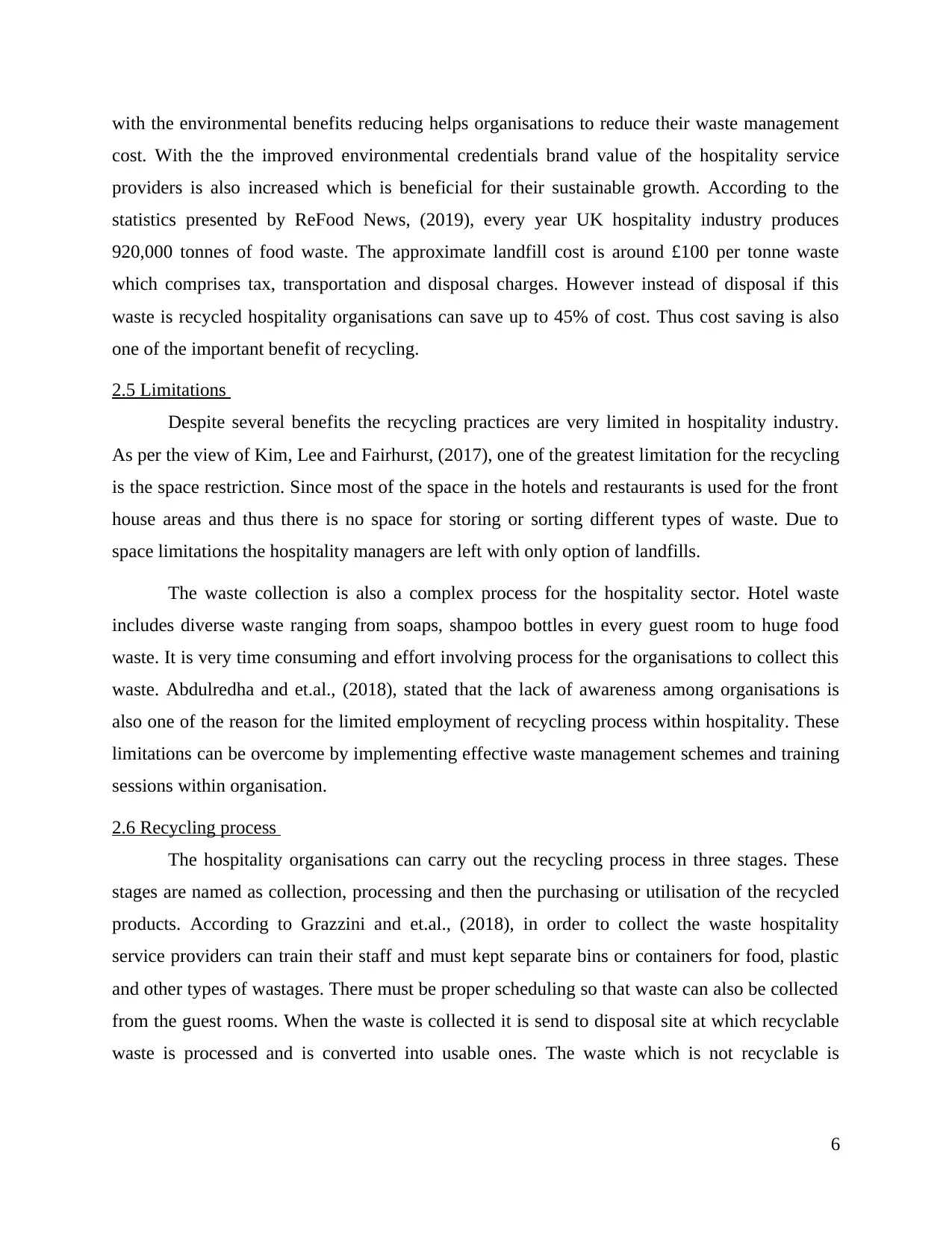
with the environmental benefits reducing helps organisations to reduce their waste management
cost. With the the improved environmental credentials brand value of the hospitality service
providers is also increased which is beneficial for their sustainable growth. According to the
statistics presented by ReFood News, (2019), every year UK hospitality industry produces
920,000 tonnes of food waste. The approximate landfill cost is around £100 per tonne waste
which comprises tax, transportation and disposal charges. However instead of disposal if this
waste is recycled hospitality organisations can save up to 45% of cost. Thus cost saving is also
one of the important benefit of recycling.
2.5 Limitations
Despite several benefits the recycling practices are very limited in hospitality industry.
As per the view of Kim, Lee and Fairhurst, (2017), one of the greatest limitation for the recycling
is the space restriction. Since most of the space in the hotels and restaurants is used for the front
house areas and thus there is no space for storing or sorting different types of waste. Due to
space limitations the hospitality managers are left with only option of landfills.
The waste collection is also a complex process for the hospitality sector. Hotel waste
includes diverse waste ranging from soaps, shampoo bottles in every guest room to huge food
waste. It is very time consuming and effort involving process for the organisations to collect this
waste. Abdulredha and et.al., (2018), stated that the lack of awareness among organisations is
also one of the reason for the limited employment of recycling process within hospitality. These
limitations can be overcome by implementing effective waste management schemes and training
sessions within organisation.
2.6 Recycling process
The hospitality organisations can carry out the recycling process in three stages. These
stages are named as collection, processing and then the purchasing or utilisation of the recycled
products. According to Grazzini and et.al., (2018), in order to collect the waste hospitality
service providers can train their staff and must kept separate bins or containers for food, plastic
and other types of wastages. There must be proper scheduling so that waste can also be collected
from the guest rooms. When the waste is collected it is send to disposal site at which recyclable
waste is processed and is converted into usable ones. The waste which is not recyclable is
6
cost. With the the improved environmental credentials brand value of the hospitality service
providers is also increased which is beneficial for their sustainable growth. According to the
statistics presented by ReFood News, (2019), every year UK hospitality industry produces
920,000 tonnes of food waste. The approximate landfill cost is around £100 per tonne waste
which comprises tax, transportation and disposal charges. However instead of disposal if this
waste is recycled hospitality organisations can save up to 45% of cost. Thus cost saving is also
one of the important benefit of recycling.
2.5 Limitations
Despite several benefits the recycling practices are very limited in hospitality industry.
As per the view of Kim, Lee and Fairhurst, (2017), one of the greatest limitation for the recycling
is the space restriction. Since most of the space in the hotels and restaurants is used for the front
house areas and thus there is no space for storing or sorting different types of waste. Due to
space limitations the hospitality managers are left with only option of landfills.
The waste collection is also a complex process for the hospitality sector. Hotel waste
includes diverse waste ranging from soaps, shampoo bottles in every guest room to huge food
waste. It is very time consuming and effort involving process for the organisations to collect this
waste. Abdulredha and et.al., (2018), stated that the lack of awareness among organisations is
also one of the reason for the limited employment of recycling process within hospitality. These
limitations can be overcome by implementing effective waste management schemes and training
sessions within organisation.
2.6 Recycling process
The hospitality organisations can carry out the recycling process in three stages. These
stages are named as collection, processing and then the purchasing or utilisation of the recycled
products. According to Grazzini and et.al., (2018), in order to collect the waste hospitality
service providers can train their staff and must kept separate bins or containers for food, plastic
and other types of wastages. There must be proper scheduling so that waste can also be collected
from the guest rooms. When the waste is collected it is send to disposal site at which recyclable
waste is processed and is converted into usable ones. The waste which is not recyclable is
6
Paraphrase This Document
Need a fresh take? Get an instant paraphrase of this document with our AI Paraphraser
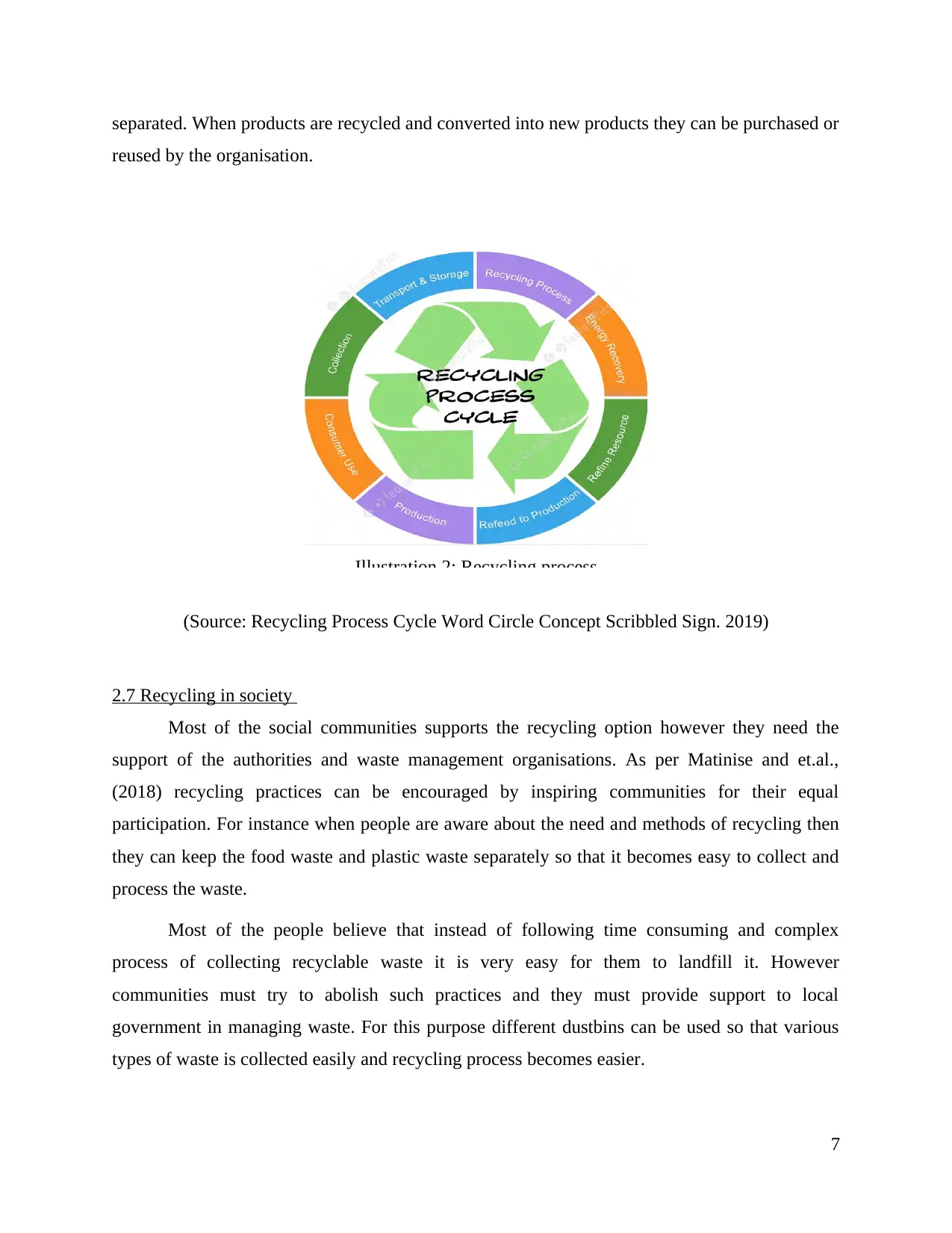
separated. When products are recycled and converted into new products they can be purchased or
reused by the organisation.
(Source: Recycling Process Cycle Word Circle Concept Scribbled Sign. 2019)
2.7 Recycling in society
Most of the social communities supports the recycling option however they need the
support of the authorities and waste management organisations. As per Matinise and et.al.,
(2018) recycling practices can be encouraged by inspiring communities for their equal
participation. For instance when people are aware about the need and methods of recycling then
they can keep the food waste and plastic waste separately so that it becomes easy to collect and
process the waste.
Most of the people believe that instead of following time consuming and complex
process of collecting recyclable waste it is very easy for them to landfill it. However
communities must try to abolish such practices and they must provide support to local
government in managing waste. For this purpose different dustbins can be used so that various
types of waste is collected easily and recycling process becomes easier.
7
Illustration 2: Recycling process
reused by the organisation.
(Source: Recycling Process Cycle Word Circle Concept Scribbled Sign. 2019)
2.7 Recycling in society
Most of the social communities supports the recycling option however they need the
support of the authorities and waste management organisations. As per Matinise and et.al.,
(2018) recycling practices can be encouraged by inspiring communities for their equal
participation. For instance when people are aware about the need and methods of recycling then
they can keep the food waste and plastic waste separately so that it becomes easy to collect and
process the waste.
Most of the people believe that instead of following time consuming and complex
process of collecting recyclable waste it is very easy for them to landfill it. However
communities must try to abolish such practices and they must provide support to local
government in managing waste. For this purpose different dustbins can be used so that various
types of waste is collected easily and recycling process becomes easier.
7
Illustration 2: Recycling process
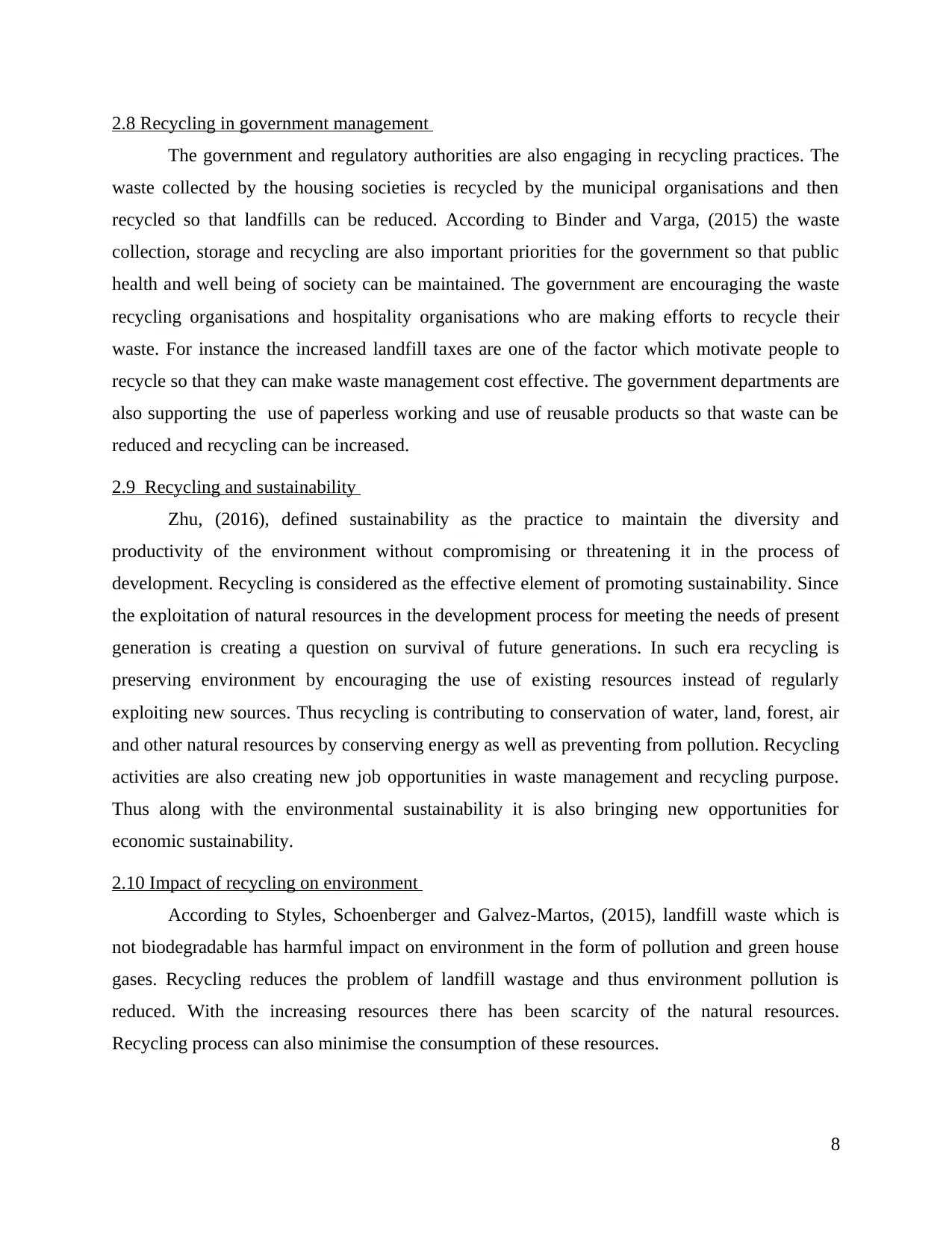
2.8 Recycling in government management
The government and regulatory authorities are also engaging in recycling practices. The
waste collected by the housing societies is recycled by the municipal organisations and then
recycled so that landfills can be reduced. According to Binder and Varga, (2015) the waste
collection, storage and recycling are also important priorities for the government so that public
health and well being of society can be maintained. The government are encouraging the waste
recycling organisations and hospitality organisations who are making efforts to recycle their
waste. For instance the increased landfill taxes are one of the factor which motivate people to
recycle so that they can make waste management cost effective. The government departments are
also supporting the use of paperless working and use of reusable products so that waste can be
reduced and recycling can be increased.
2.9 Recycling and sustainability
Zhu, (2016), defined sustainability as the practice to maintain the diversity and
productivity of the environment without compromising or threatening it in the process of
development. Recycling is considered as the effective element of promoting sustainability. Since
the exploitation of natural resources in the development process for meeting the needs of present
generation is creating a question on survival of future generations. In such era recycling is
preserving environment by encouraging the use of existing resources instead of regularly
exploiting new sources. Thus recycling is contributing to conservation of water, land, forest, air
and other natural resources by conserving energy as well as preventing from pollution. Recycling
activities are also creating new job opportunities in waste management and recycling purpose.
Thus along with the environmental sustainability it is also bringing new opportunities for
economic sustainability.
2.10 Impact of recycling on environment
According to Styles, Schoenberger and Galvez-Martos, (2015), landfill waste which is
not biodegradable has harmful impact on environment in the form of pollution and green house
gases. Recycling reduces the problem of landfill wastage and thus environment pollution is
reduced. With the increasing resources there has been scarcity of the natural resources.
Recycling process can also minimise the consumption of these resources.
8
The government and regulatory authorities are also engaging in recycling practices. The
waste collected by the housing societies is recycled by the municipal organisations and then
recycled so that landfills can be reduced. According to Binder and Varga, (2015) the waste
collection, storage and recycling are also important priorities for the government so that public
health and well being of society can be maintained. The government are encouraging the waste
recycling organisations and hospitality organisations who are making efforts to recycle their
waste. For instance the increased landfill taxes are one of the factor which motivate people to
recycle so that they can make waste management cost effective. The government departments are
also supporting the use of paperless working and use of reusable products so that waste can be
reduced and recycling can be increased.
2.9 Recycling and sustainability
Zhu, (2016), defined sustainability as the practice to maintain the diversity and
productivity of the environment without compromising or threatening it in the process of
development. Recycling is considered as the effective element of promoting sustainability. Since
the exploitation of natural resources in the development process for meeting the needs of present
generation is creating a question on survival of future generations. In such era recycling is
preserving environment by encouraging the use of existing resources instead of regularly
exploiting new sources. Thus recycling is contributing to conservation of water, land, forest, air
and other natural resources by conserving energy as well as preventing from pollution. Recycling
activities are also creating new job opportunities in waste management and recycling purpose.
Thus along with the environmental sustainability it is also bringing new opportunities for
economic sustainability.
2.10 Impact of recycling on environment
According to Styles, Schoenberger and Galvez-Martos, (2015), landfill waste which is
not biodegradable has harmful impact on environment in the form of pollution and green house
gases. Recycling reduces the problem of landfill wastage and thus environment pollution is
reduced. With the increasing resources there has been scarcity of the natural resources.
Recycling process can also minimise the consumption of these resources.
8
⊘ This is a preview!⊘
Do you want full access?
Subscribe today to unlock all pages.

Trusted by 1+ million students worldwide
1 out of 44
Related Documents
Your All-in-One AI-Powered Toolkit for Academic Success.
+13062052269
info@desklib.com
Available 24*7 on WhatsApp / Email
![[object Object]](/_next/static/media/star-bottom.7253800d.svg)
Unlock your academic potential
Copyright © 2020–2026 A2Z Services. All Rights Reserved. Developed and managed by ZUCOL.





